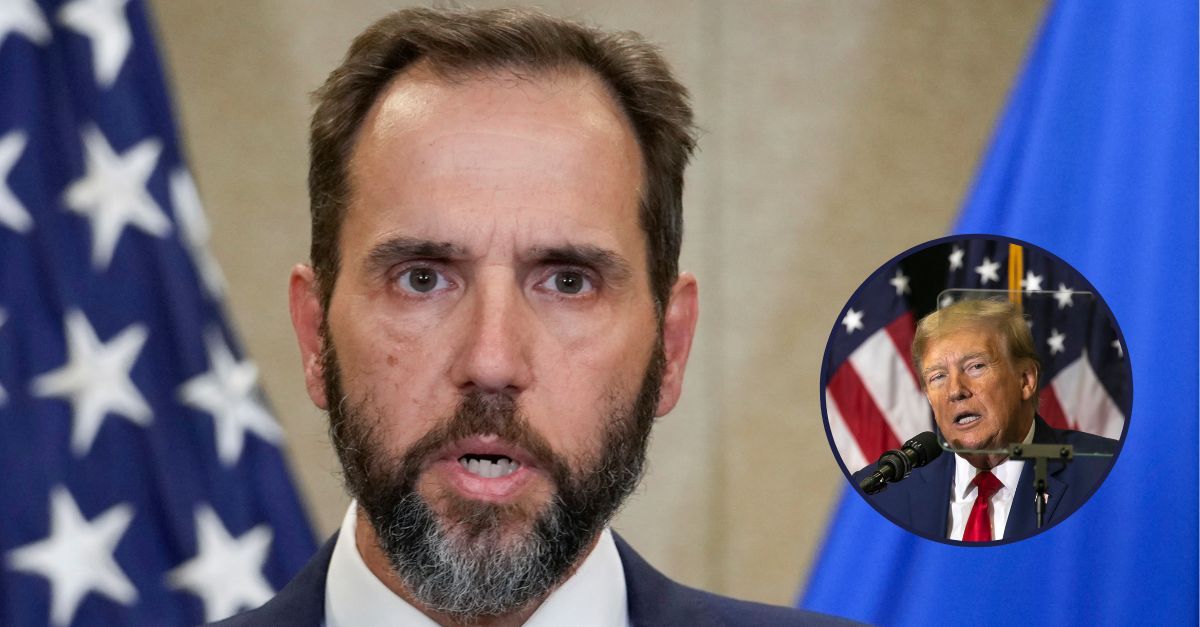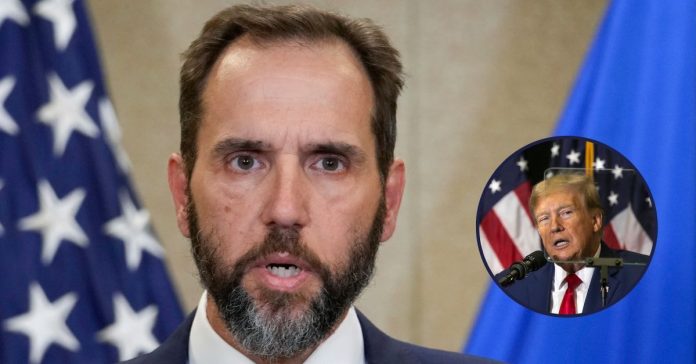
Background: Special counsel Jack Smith. (AP Photo/J. Scott Applewhite, File) Inset: Republican presidential candidate and former President Donald Trump speaks to the crowd during a caucus event, Saturday, Dec. 2, 2023, at Kirkwood Community College in Cedar Rapids, Iowa. (Geoff Stellfox/The Gazette via AP)
Special counsel Jack Smith, ever quick on the draw, urged the U.S. Supreme Court on Wednesday to deny former President Donald Trump’s recent request for a stay of the criminal proceedings based on the pro-Trump riots at the U.S. Capitol Complex on Jan. 6, 2021.
The government says the 45th president’s latest effort is an affront to the internal U.S. order — and should not be entertained.
“The charged crimes strike at the heart of our democracy,” the response brief reads. “A President’s alleged criminal scheme to overturn an election and thwart the peaceful transfer of power to his successor should be the last place to recognize a novel form of absolute immunity from federal criminal law. Applicant seeks a stay to prevent proceedings in the district court from moving towards trial.”
Late Monday, Trump asked the nation’s high court to indefinitely pause the federal case against him filed by Smith for his defense attorneys to prepare and then file a genuine petition for writ of certiorari that could, likely weeks down the road, lead to oral arguments and a precedent-setting ruling on presidential immunity.
The special prosecutor’s response notes that the trial in the case was originally slated by the district court judge to begin on March 4, but the appeals process has already kicked the can substantially.
“Applicant’s interlocutory appeal placed the district court proceedings on hold, thus delaying the trial and verdict in this case,” the brief reads.
Trump’s procedural asks of the Supreme Court — to pause the entire case while his defense attorneys craft a more thorough appeal — are ultimately all about delaying the inevitable, Smith argues.
“He has no entitlement to a further stay while seeking discretionary review from this Court,” the response brief reads. “Delay in the resolution of these charges threatens to frustrate the public interest in a speedy and fair verdict — a compelling interest in every criminal case and one that has unique national importance here, as it involves federal criminal charges against a former President for alleged criminal efforts to overturn the results of the Presidential election, including through the use of official power.”
At the moment, Trump’s arguments on immunity have been rejected at both the district court and the appellate court levels. In the latter case, however, those immunity arguments were, so far, only shut down by a three-judge panel — and Trump intends to have the case reviewed en banc — or by the entire appeals court. Under the current judgment issued by the Washington, D.C., court of appeals, the case was slated to return to the trial court level absent such a review, where it would likely be set for trial. Trump has complained that this was before the “traditional” appeals process was allowed to play out.
Smith says the latest-requested pause should be denied because Trump will never be able to make his case before the Supreme Court.
From the 40-page filing, at length:
Here, [Trump’s] request fails for two interrelated reasons: first, he cannot show the requisite likelihood that this Court would reverse the judgment and sustain his extraordinary claim of absolute immunity; and, second, the serious harm to the government — and to the public — of postponing the resolution of the criminal charges against [Trump] outweighs any equities he can assert to preclude further pretrial proceedings while he seeks certiorari. The thorough opinions of the courts below considering and unanimously rejecting his arguments — and [Trump’s] failure to point to any Founding Era suggestion of such absolute immunity, any former President making such a claim, or even any scholarly commentary positing such immunity — underscore how remote the possibility is that this Court will agree with his unprecedented legal position. And the public interest in a prompt trial is at its zenith where, as here, a former President is charged with conspiring to subvert the electoral process so that he could remain in office.
The government also does not shy away from noting that they do, in fact, want to quickly resolve Trump’s Jan. 6 case — something the former president complained about in his stay application.
“[T]he public interest in a prompt trial is at its zenith where, as here, a former President is charged with conspiring to subvert the electoral process so that he could remain in office,” the response brief reads. “The Nation has a compelling interest in seeing the charges brought to trial.”
Trump’s application says Smith cited only the “imperative public importance of a prompt resolution” of the case when arguing and winning the denial of Trump’s immunity claim before the D.C. Circuit panel — and the subsequent almost-immediate return to U.S. District Judge Tanya Chutkan’s court.
Smith’s response brief, on the merits of the case itself, is uncannily similar to an amicus brief filed Tuesday by a group of constitutional law professors. In both briefs, the major argument is that Trump’s claims of absolute immunity have no support within the context or history of the U.S. Constitution.
“Applicant’s novel immunity claim would ‘collapse our system of separated powers by placing the President beyond the reach of all three Branches,”” the response brief reads. “The absence of any such absolute immunity claim throughout our history weighs heavily against its novel recognition now.”
But, in the event the Supreme Court is inclined to grant some form of relief for the ex-president, Smith has no problem with Trump pleading his immunity case before the nine justices — he just doesn’t think Trump should be granted a delay to craft an entirely new appeal.
“Expedited briefing and argument would be appropriate given the parties’ just-completed briefing of the same issues in the court of appeals on an equally expedited schedule,” the reply reads. “The application for a stay of the mandate should be denied. Alternatively, the Court should treat the application as a petition for a writ of certiorari, grant the petition, and order expedited briefing and argument.”
In the underlying case, Smith is prosecuting Trump on four criminal counts, including conspiracy to defraud the United States, conspiracy to obstruct the U.S. Congress, and conspiracy against rights.
Have a tip we should know? [email protected]

